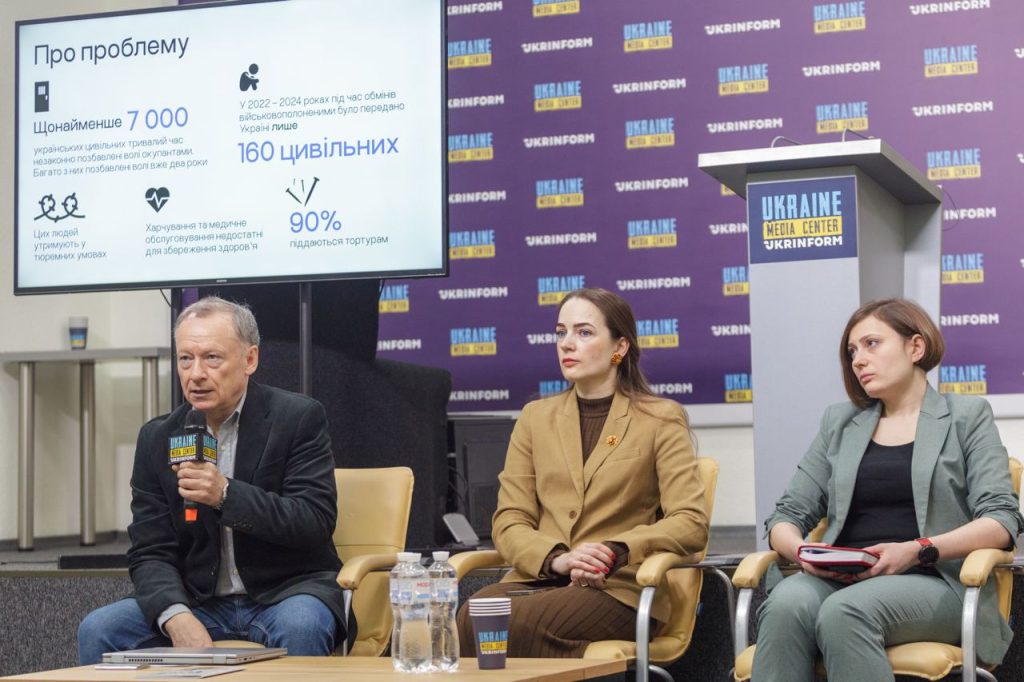Strategy for the release of civilian internees: Human rights advocates have crafted a blueprint to expedite the repatriation of individuals unlawfully held by russia
russia currently holds over 7,000 civilians in occupied areas and within its borders. Despite the transfer of 160 civilian hostages to Ukraine in prisoner-of-war swaps over the past two years amid an all-out invasion, the current pace suggests it could take a century to secure the release of all detainees. Hence the imperative for a systematic approach to liberate civilians held by russia, free from any exchange or conditions.

Thus, the Center for Civil Liberties, in collaboration with the Coordination Headquarters for Prisoner of War Treatment, has devised a Strategy for the Release of Civilians, unveiled at the Media Center Ukraine – Ukrinform.
Dr. Mykhailo Savva, a political science expert and member of the Center for Civil Liberties’ advisory board, highlighted during the presentation that the Strategy outlines a cohesive plan with dual aims: safeguarding the rights of detained civilians and effectuating their release from detention facilities.
The primary focus of the Strategy is on civilians not convicted by russian courts and lacking any criminal charges against them. In such instances, human rights activists advocate for unconditional release without resorting to exchanges.
“This Strategy categorically rejects the notion of exchanging Ukrainian civilians for any other individuals,” emphasized Savva.
He stressed that a pivotal component of the Strategy hinges on demanding the release of civilians based on russia’s violations of the Convention against Torture and Other Cruel, Inhuman or Degrading Treatment or Punishment.
“The initial step involves petitioning the russian authorities, as stipulated by the Convention. This necessitates Ukrainian authorities to initiate dialogue with russia. We understand the gravity of this decision, but we perceive no alternative. Subsequently, the Strategy mandates demanding the establishment of international arbitration in case of rejection. Again, in accordance with the Convention, these steps are imperative. If russia fails to agree to an arbitrator within six months, Ukraine retains the right to petition the International Court of Justice. Only the Ukrainian government holds this authority,” clarified Savva.
The civilian release Strategy also encompasses a spectrum of influence tactics: legal, diplomatic, economic, and humanitarian.
Legal measures entail identifying the heads of russian detention facilities where Ukrainian civilians are held and orchestrating legal prosecution in Ukraine and abroad.
Moreover, part of the legal Strategy involves creating conditions for the International Criminal Court to issue warrants for the unlawful detention of civilians.
Diplomatic influence strategies outlined in the Strategy advocate for leveraging the capacities of UN entities, including UN special rapporteurs like the rapporteur on enforced disappearances, on a broader scale. Additionally, initiating dialogue with the International Committee of the Red Cross donors is deemed essential.
Economic leverage strategies involve crafting a specialized package of sanctions.
Regarding humanitarian efforts, the Strategy outlines several key actions: launching an international information campaign, gathering signatures, and petitioning the UN General Assembly—which has the authority to consider petitions from non-governmental organizations—engaging a broad array of influencers to pressure the russian leadership to release all unlawfully detained Ukrainian civilians, and highlighting through media and social networks the legal actions taken against officials of russian detention facilities and other perpetrators.
Mykhailo Savva underscored that the central government of Ukraine holds sole authority to implement the pivotal aspect of the Strategy, specifically the application under the Convention against Torture.
“Moving forward, Ukrainian authorities are cognizant of the avenues available to secure the release of civilians. The Center for Civil Liberties remains committed to its efforts, doing everything within our power. We also extend the invitation to collaborate on actions beyond our individual capacities,” he concluded.
For further details on the Strategy for civilian release, please refer to the provided link.
Read more: https://mediacenter.org.ua/news
 Back
Back 